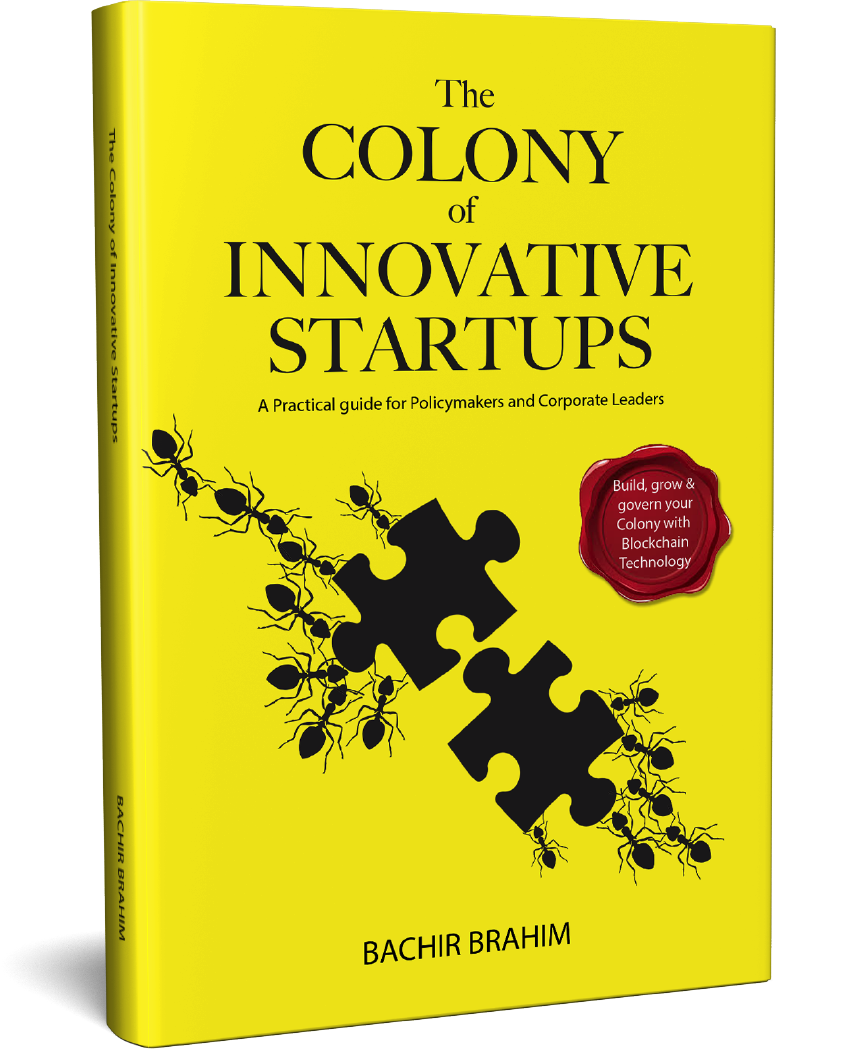RESOURCES

The Colony of Innovative Startups:
A Practical Guide for Policymakers and Corporate Leaders
This book is the result of fifteen (15) years of learning, research, travel journey, and successful case studies analysis about innovation and entrepreneurship in four continents. A journey that reflects the pursuit of views, beliefs, and opinions around the degree of strength or weakness, success, or failure of different entrepreneurship initiatives worldwide. Following their paths in the creation of a positive, and suitable entrepreneurship environment for the development and growth of innovative startups. The main purpose of this book is to provide policymakers, corporate leaders, young entrepreneurs, and academic researchers with practical tools and guidance that may enlighten their visions. A guide that will contribute positively to building a suitable environment for the development of entrepreneurship initiatives, will able them to implement a sustainable strategy for cultivating and growing innovative startups.

The reader of this book may notice a slightly different approach used in describing the entrepreneurship and innovations ecosystems as the colony of innovative startups. The main idea behind that is the awareness about the current situation of different business climates, and the necessity for such a contribution to solving different problems that hindering the growth of innovative startups, and the sustainability of different entrepreneurship initiatives worldwide. I hope to achieve a maximum of success and growth for different initiatives, which will have a positive impact on economic development.
THE PROBLEM
Entrepreneurship Initiatives are Popping-Up Dispersed and Disturbed
There are thousands of entrepreneurship initiatives that pop-up like mushrooms every day. You can call them Excellent Polls, Innovative Clusters, Incubators, Hubs, Start-up Labs, Science-Parks, Tech-parks, etc. Initiatives with the ultimate goal to create the Next X Silicon Valley. An imitation effort to reproduce, without a single understanding of the context, the history, the resources, and the vision that led to the San Diego Silicon Valley, home of multi-billion tech-giants. Many concrete examples of these initiatives, which are still subject to critiques and sometimes to controversy, about their outcomes and real contributions to economic growth. Cases from the Munich Smart City in Germany; the Creative Cluster in Australia; Kista, and Ideon in Sweden; Technology Triangle of Waterloo in Canada; the Masdar of the UAE among many others.
All these initiatives have different structures and their ways of contributing to the country’s GDP are also different. However, all of them have similar goals, which is the creation of a successful business environment for startups. An environment where several startups together with other stakeholders, play a vital role in the development of their national economy.
Many of these initiatives are mainly consequences of the principle of Knowledge-based economies. Other are the results of a combination of interactions between different stakeholders inside the ecosystem, following the Triple Helix Model (Etzkowitz & Leydesdorff, 1995). Because they are geographically dispersed, it is almost impossible to measure the value added by every initiative in a single country. The focus was always on limited targets at a local or national level. These initiatives are also characterized by limited resources and actors, to cover large scale targets and have a significant contribution to the country’s economic development.
The Solution
A colony that Consolidates and Reassembles Efforts
This book is not introducing the secret formula to rebuild your own Silicon Valley. It proposes a logical solution to enhance and build a suitable, and positive climate for startups. To consolidate multiple entrepreneurship initiatives in one project, which will collect maximum resources and integrate a considerable number of players. The mainstream inspiration of this book comes from the phenomenal of the self-organized colony of ants, such a biological ecosystem of social insects that run and sustain its growth perfectly. A business model that inspires from the collective behavior of ants, which generated the swarm intelligence.

A smart swarm is reflected by tasks and labor organizations for every member within the colony. This book will try to export the ants' collective behavior “Business Model” into the world of entrepreneurship and innovation. A model reflected by a new concept of building a positive environment for startups to grow and flourish, which I call in this book “A Colony of Innovative Startups.” It involves many stakeholders that interact together within a particular geographic space, where they can cooperatively allocate considerable resources and contribute to achieving the colony objectives of growth and sustainability.
“Let us learn how to build a Colony of Innovative Startups!”

Who Should Read This Book?
The book you are about to read is essentially destined to four (04) types of readers who may have a direct interest in the topics of Innovation and Entrepreneurship. Although the list is not exhaustive rather to better guides the reader towards the desired goals of this book.

Policymakers
at the Governmental
Level
Policymakers at the Governmental Level who are decision-makers in the economic development policies. They generally monitor and oversee the elaboration of long-term strategies and policies that contribute to solving social and economic problems. Such a book will provide them with essential tools that help in strengthening their efforts in promoting entrepreneurship and innovation, hence it will give them a detailed roadmap to build a suitable entrepreneurial environment for innovative startups to grow and flourish.

Corporate Leaders, Investors, and Serial Entrepreneurs
Corporate Leaders, Investors, and Serial Entrepreneurs who are in charge of running well-established corporations. They have a broad experience in driving successful businesses on a global scale. This guide may be useful for those willing to expand their businesses to wider markets, through a large network of small innovative startups that support and sustain the growth of the existed businesses.

Academia
Researchers
Academia Researchers who are teaching innovation and entrepreneurship at different universities and schools. They are the source of knowledge and innovations that solve multiple problems we are facing. It is the university researcher who has the mission to advising policymakers, and corporate leaders on the latest breakthrough innovations, they are in charge to spread knowledge and innovations to a larger audience.

Mentors, Experts, and Consultants
Mentors, Experts, and Consultants who are professionals from several fields of industry, passionate with entrepreneurship and innovation. They are in a continuous mission that is assisting and helping entrepreneurs through mentoring and transfer of expertise, so they can learn from their long-standing experiences. They are volunteers who accept to transfer knowledge and share their life experiences with others. Just to help them learn from the mistakes and take lessons in building and successfully driving their startups.
I add to them, Aspiring Entrepreneurs and Innovators who want to start an entrepreneurial journey.
They are exceptional people, with distinguishing talents, who want to draw their paths individually and build their own careers. Dreamers who want to change the world with their innovative ideas, who are keen to learn how to become successful. Influencers who provide solutions to social and economic problems, hence create value and add wealth to society that enhances economic development.
The list is not exhaustive, as specialized people interested in combining biology and business, people from bioengineering, biotechnology, or organizational behavior of social insects are warmly welcomed to share their thoughts and contribute to enriching the interdisciplinary research collaborations.



